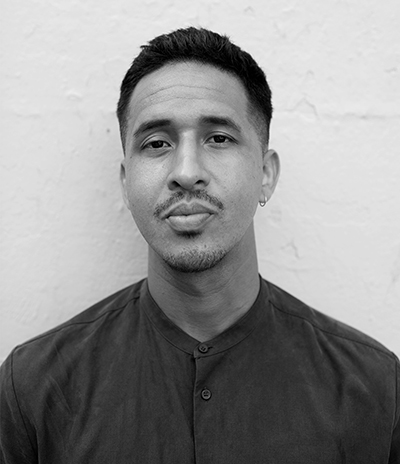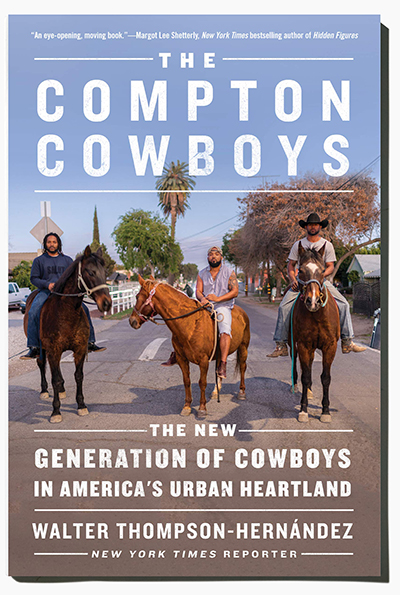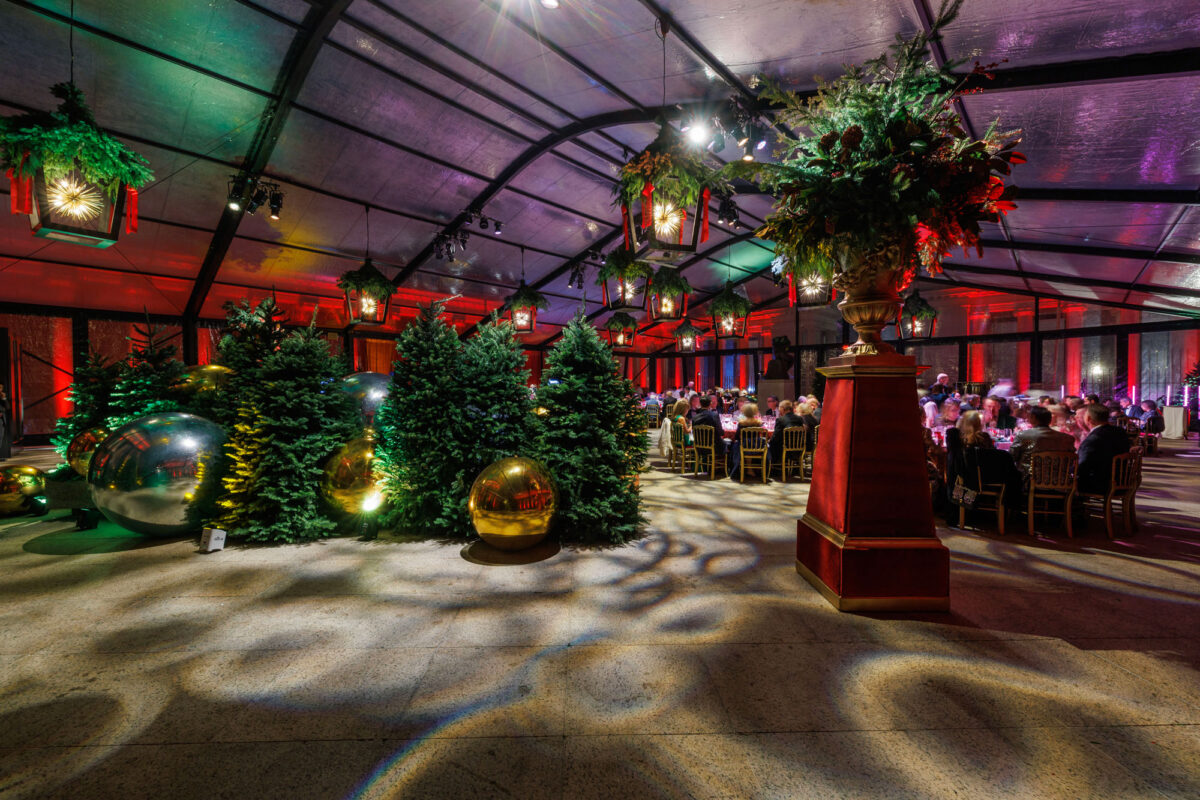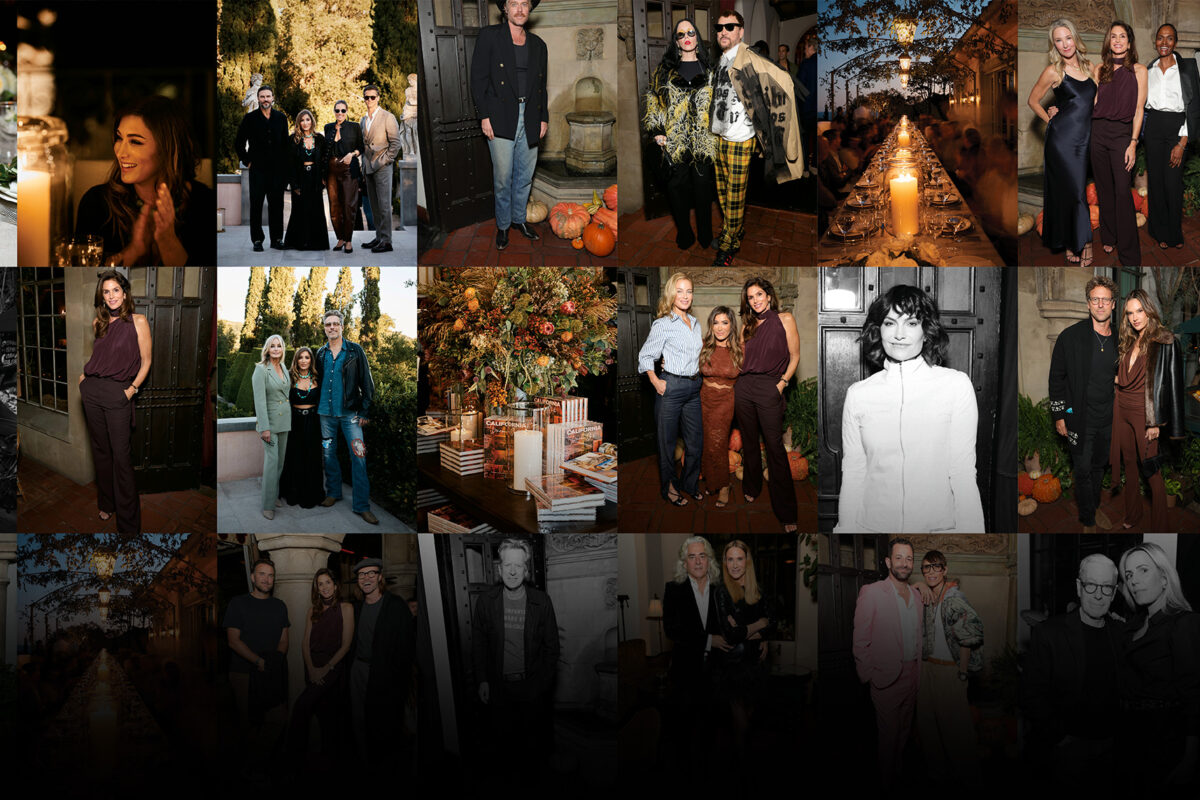One of the enduring images of the protests in L.A. will be that of a group of black ranchers riding through South Central on horseback. We hear from their leader, Randy Hook, and the writer who has recently published a book about them
Interviews by COURTNEY ELLZEY and THE EDITORS
Photography by COURTNEY ELLZEY
While the Compton Cowboys have only been in existence since 2017, the nine men and one woman who teach riding and ranching and act as community role models have been friends for over 20 years.
They met as members of the Compton Jr. Posse, a nonprofit organization founded by Mayisha Akbar in Richland Farms, a semirural area in Compton that has been home to black horse riders since the mid-20th century. Encouraged by friends and relatives to sign up as children, they spent time on the ranch and riding horses on the streets, affording them a certain amount of protection from the surrounding gangs and violence, a fact explored in the new book The Compton Cowboys, The New Generation of Cowboys in America’s Urban Heartland (William Morrow, $29) by Walter Thompson-Hernández.
The riders are also the focus of Courtney Ellzey’s “Unbridled,” a collection of photographs documenting the riders’ work and mentorship with at-risk youth. Shot at Paramount Ranch — just months before the iconic western set was mostly destroyed by the Woolsey Fire in late 2018 — “Unbridled” is a traveling exhibit that represents “a release from restraint,” Ellzey says. She adds, “At the heart of my collaboration is the passion to share in the story of the black cowboy, which must be told and historically documented.”
For C, Ellzey (who is the CEO and founder of Ventura-based hat line Vanner Hats), shared her inspiring images and interviewed Randall “Randy” Hooke, one of the founding members of the Compton Cowboys who now serves as executive director of the Compton Jr. Posse, furthering the dedicated work of Akbar and the program that continues to change lives today.
• • • • •
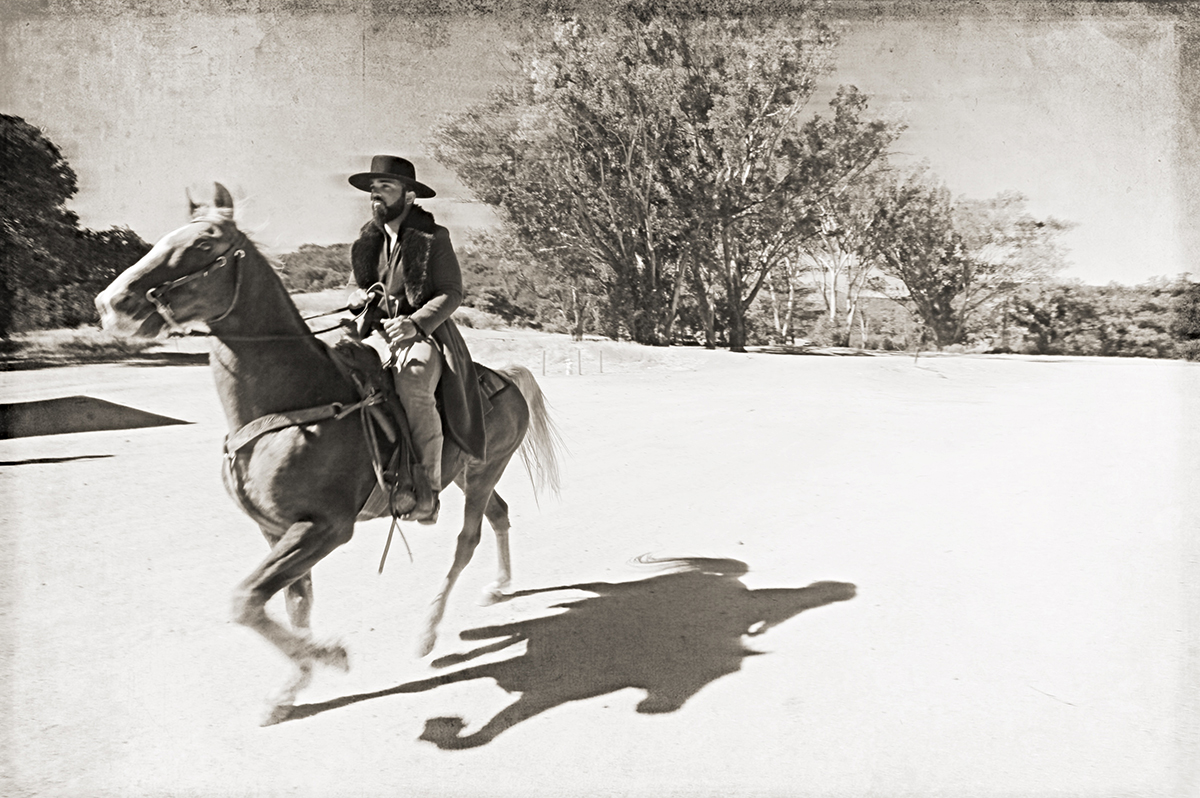
RANDY HOOK
The Compton Cowboys’ de facto leader explains the overarching mission of mentorship, community engagement and cultural change, plus a longer-term ambition to introduce inner-city ranching on a global scale.
What does it mean to be a Compton Cowboy?
Firstly, it means to be a lover of the city of Compton; to have pride in the city, to understand the significance of what it means to be from the city and being connected to that lineage and that history. Another part is to understand the impact and significance of being connected with nature in order to move forward in life and to be the best person you could possibly be. In particular with horses. And it’s all about changing culture. As Compton Cowboys, we represent a new guard, a new generation of horse folks, young black folks, of inner-city folks, putting that all into one pot and stirring it up, and going out there and breaking down the barriers and starting a new definition for what it means to be a cowboy, what it means to be black, what it means to be inner city. We want to be that voice in the fight for good. We want to be on the front line, loud and vocal about what we want to get done, which is whatever is good for the city and the people and the kids.
How important are the horses in what you do?
We understand the power of the horse, the beauty of the horse and the spirit of the horse that helps us to navigate life’s ins and outs and being just good, decent human beings on this Earth and doing what we believe to be the work of God and the work of good folks.
“We represent a new guard, a new generation of horse folks, young black folks, of inner-city folks”
RANDY HOOK
What role do you play in the wider community?
We believe in the kids. We are all about giving back. That’s a big part of our brand and our group, our mission, our essence. We want to be role models, people the young people can look up to as a source of inspiration. To look at us and say, “I’d like to model myself after what they do.” Where we come from in the inner city, especially in Compton, you can grow up rough, and a lot of it has to do with lack of guidance and a lack of positive role models. We are very specific about setting that tone of being upstanding citizens. The second part of it is being mentors. Being able to have the insights, experience and education in anything we have to give, we want to be able to give that back and share it with whoever needs it. Sometimes it’s not just a kid. Sometimes it is peers, sometimes it is elders and other community members who want to establish something and do something good, or who want advice on something and how to move forward on that.
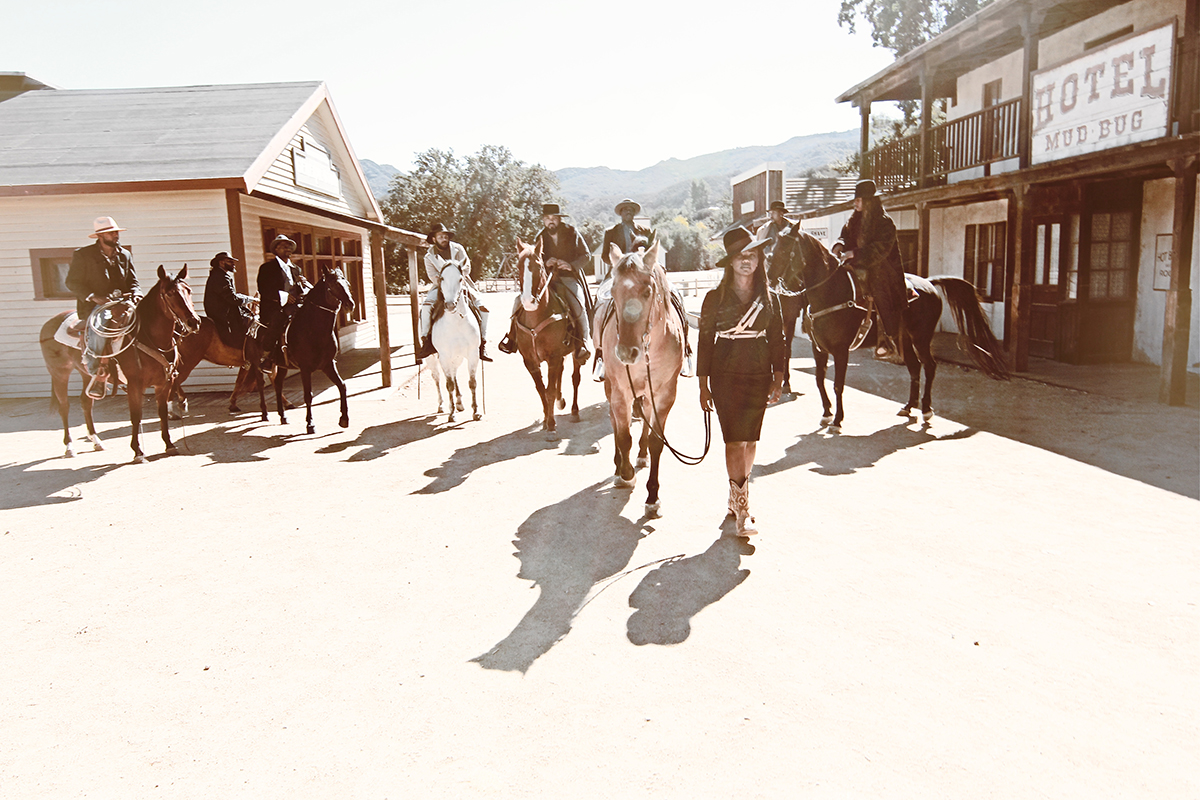
Why does farming and ranching feature so prominently?
In the community, we’re all farmers, ranch folks, so we’re all in this really nice ecosystem of give and take, and sharing when it comes to crops or resources. Recently, we traded some goats for some cows. If somebody has trailer parts or tools, we are a source of resources for the wider community in the farm and the city of Compton.
What is the structure of the group?
The Compton Cowboys are a talent group, like a band or a dance group. I’m the managing member, but all of us have different backgrounds. Keiara is a rodeo girl, and that’s really exciting. Keenan is a chef, and he’s working on a concept for a ranch experience that is like an outdoor farm-to-table eatery. We are all alumni of the Compton Jr. Posse, which was an organization founded by my aunt in 1988, that we all grew up in, learning how to ride. The main requirements are intangible things, a certain kind of spirit, if you know what I mean — honesty, integrity, [to be] hard-working and all about the group and all about the kids.
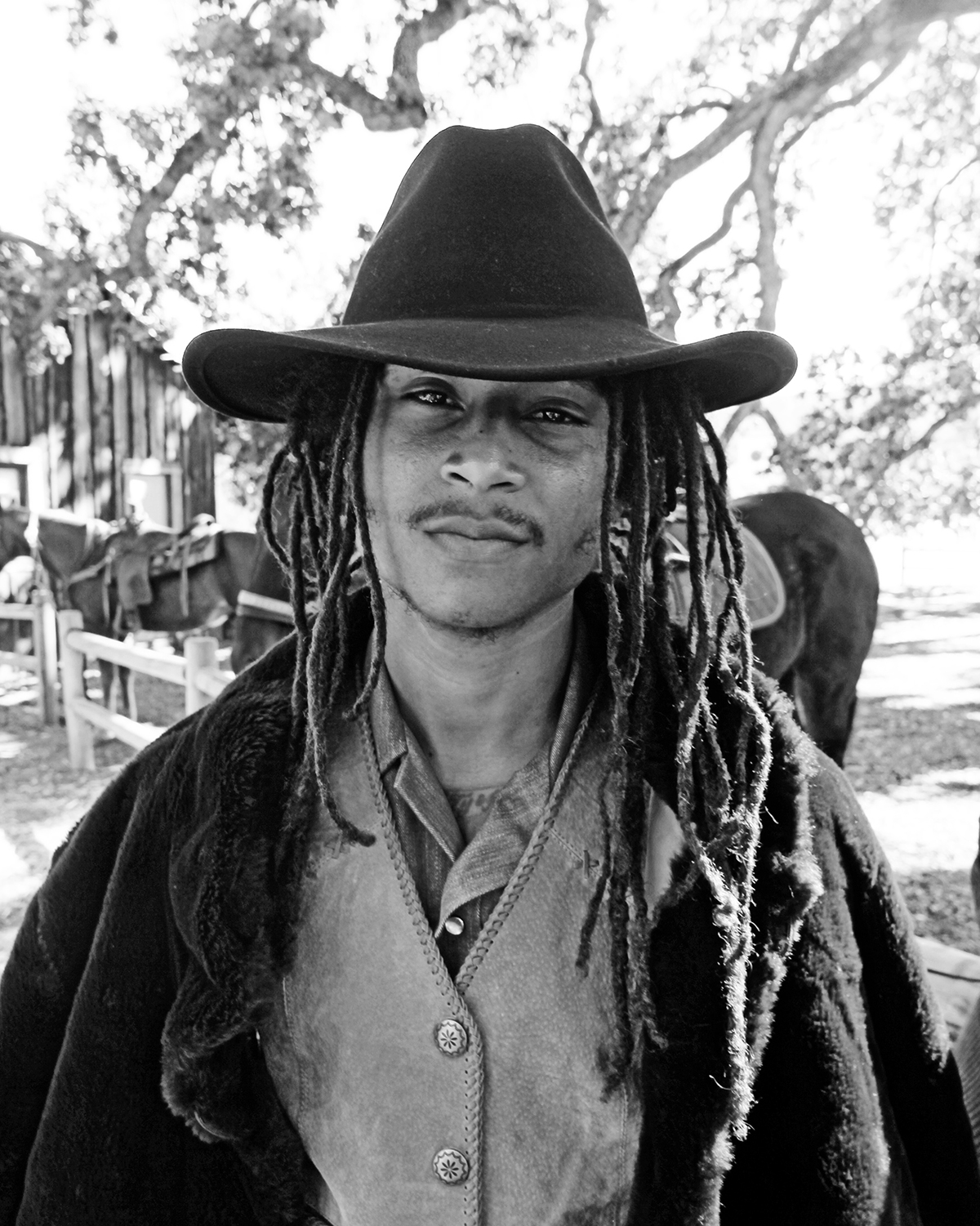
And you are a nonprofit?
The Compton Jr. Equestrians is our nonprofit organization, where we do all our stuff at the ranch, and everything there has an on-site facility. So, I executive-direct the Compton Jr. Equestrians, so two of the Cowboys are staff under that. Anthony is our ranch manager; he is here Monday through Friday, making sure maintenance and horse care is kept up, and Keenan is his fill-in for nights and weekends.
How will it continue into the next generation?
We are always excited about teaching our kids and grooming them to take their riding and ranching, and farming life to the next level. We have a few kids who are excited about rodeo and raising stock. Our whole thing right now is using the entertainment industry as an engine to raise awareness about our story and our existence, and then that awareness helps raise money to donate back to our ranch and our program so we can keep it going for the kids and community, so we can build futures for them.
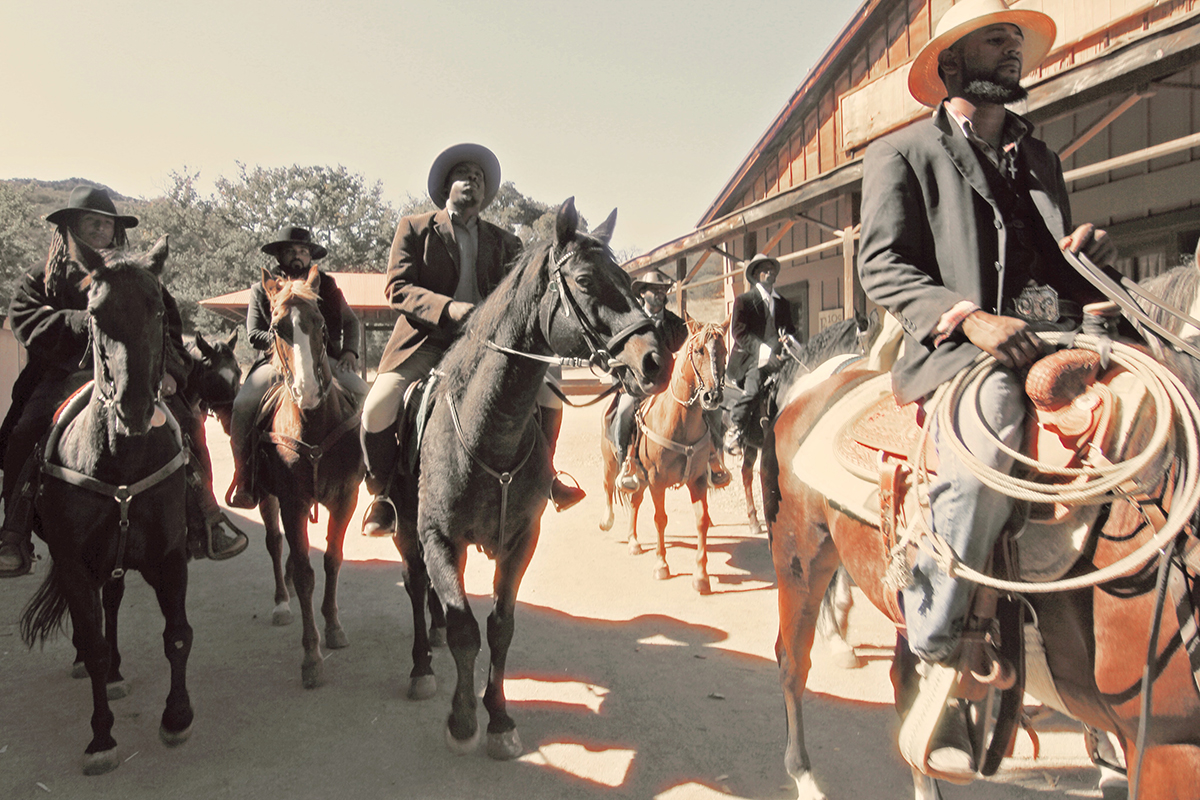
What is up next for the Cowboys?
I am working with Dr. Dre, and there’s music coming out, which is going to change the game as far as what we are doing with culture, because music has always been a bold, strong key to popular culture to enact and effect change. That hasn’t really been part of the culture we have touched yet. So that’s going to be massive. Our book is out now. Our feature film is in development at Searchlight Pictures.
“Our whole thing right now is using the entertainment industry as an engine to raise awareness about our story and our existence”
RANDY HOOK
And finally, what does the long-term future hold?
We want to start scaling up and expanding our ranch operation. We want to get bigger spaces in the county and other parts of the city. Then we want to expand to different regions, and the long-term goal is international operations and ranches being in the inner cities all around the world that we oversee and manage. To build the infrastructure that can produce world-class equestrians from the inner city.
Visit the Compton Cowboys online to donate to the nonprofit or purchase merchandise.
• • • • •
WALTER THOMPSON-HERNÁNDEZ
Journalist Walter Thompson-Hernández, author of The Compton Cowboys, The New Generation of Cowboys in America’s Urban Heartland (William Morrow, $29), was born and raised in L.A. As a former writer for The New York Times, he covered global subcultures for three years.
Now he is the host of a long-form narrative podcast, called California Love (debuting July 9) with Los Angeles NPR station KPCC. Over the past two years he got to know the Compton Cowboys, spending time with them on their ranch. “The cowboys were excited,” he says about approaching them with his idea for the book. “They trusted me with their story.”
Thompson-Hernández speaks with C about the genesis of the project.
Why did you decide to write this book?
I decided to write this book because I think the story required more time and room to breathe than a 2,000-word feature could do. It felt like I was writing this book for the 6-year-old version of me — the boy who first marveled at the sight of black men and women on horses in the streets of Compton.
What most surprised you during the time you spent with them?
I really had no idea how integral the ranch was to their lives. The ranch is so much more than a place that houses horses. It’s also a central point for the community and a place where people [go] to feel safe and to heal.
“It felt like I was writing this book for the 6-year-old version of me — the boy who first marveled at the sight of black men and women on horses”
WALTER THOMPSON-HERNÁNDEZ
What’s your understanding of what it means to be a Compton Cowboy?
It’s a combination of an attempt to preserve a historic legacy and redefine and challenge stereotypes about black men and women in urban communities. The cowboys are role models throughout the city of Compton. They present young people with an alternative to gangs and violence.
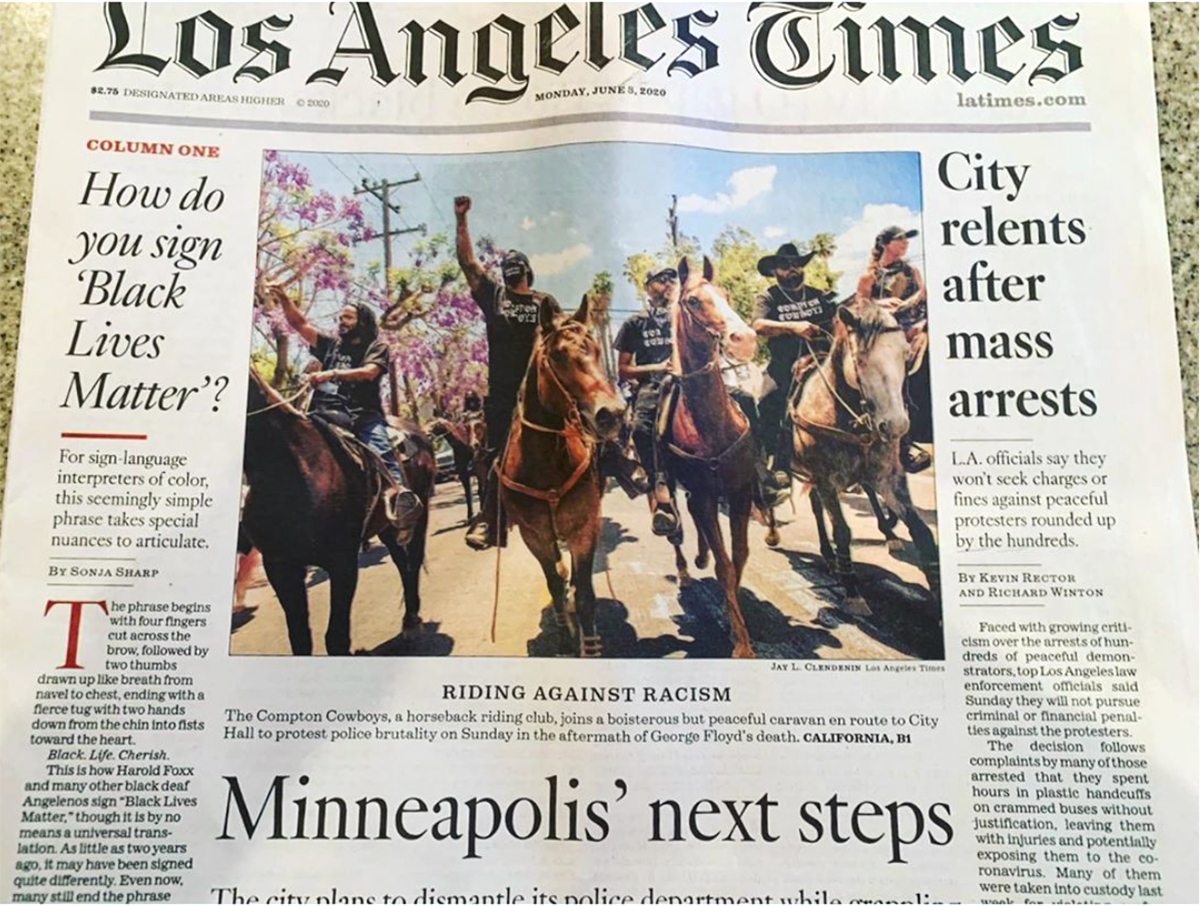
South L.A. has a history of cowboys — how far does it go back?
There have been black cowboys in Compton since the early 1940s. Back when African-Americans began to migrate from the deep south in the first half of the 20th century. Black men and women set up homes and farms in Compton because it allowed them to continue their horseback riding traditions. They transplanted their lives and made new ones.
What do you think lies ahead for the Compton Cowboys, and will it continue into the next generation?
Their biggest challenge is to keep the ranch alive and ensure that they aren’t the last black cowboys in Compton. It’s harder to attract young people to the ranch, but they are trying their best. They are also focused on setting good examples for people in their community.
Feature image: Lie in Wait. The Compton Cowboys are RANDALL HOOK, KENNETH ATKINS, CARLTON HOOK, TERRENCE HURD, TRE HOSLEY, CHARLES HARRIS JR., KEIARA WADE, KEENAN ABERCROMBIA, LAYTON BEREAL and ANTHONY HARRIS SR.
June 10, 2020
Discover more CULTURE news.

